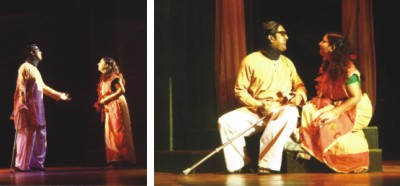|
Theatre
Poor Presentation of
Tagore's Classics
Ershad Kamol
 |
Shaila Sharmin performs the vote of the protagonist, Nandini. |
Tagore's masterpiece Raktokarobi is considered one of the greatest classics in the history of world theatre for creating some unique symbolic characters such as Nandini, Makar Raj, Ranjan, Kishor and Bishu. The play centres around a materialistic world, called 'Jaggapuri' (sacrificial ground) where there is only wealth and no touch of humanity. The leviathan king of that place, according to the mythology, is Kuber, but Tagore calls him Makar Raj, as the play is not based on myth. One day the young maiden Nandini, symbolising purity of life and emotion, comes to this place in search of Ranjan. She is in love with him. Every man, who is nothing but a part of the structure of the society there, wants her, even the King himself. But nobody gets her. As a result, the emptiness of every individual soul turns into cruelty. Tagore himself commenting on the play said that Raktokarobi is not a myth nor is it an allegory; rather, the play represents universal truth.
Raktokarobi has been presented by many theatre directors who have presented the play in different ways, however, only very few of them have interpreted the classics aptly. Currently, in Bangladesh, four troupes are staging Raktokarobi. Nagorik Natyasampraday's production is directed by Ataur Rahman, Teerjak Natyadal's production is directed by Ahmed Iqbal Haider, Dhaka University's Department of Theatre and Music's production of Raktokarobi is directed by Sudip Chakroborty and Prangone Mor's production of the play is directed by Ananta Hira.
Of these contemporary productions only young director Sudip Chakrabarty has presented the play in a new dimension following the traditional performing art form pala, since Tagore to the preface of the play labeled Raktokarobi as a pala. The other three productions have been presented on a proscenium stage. Director Ataur Rahman has featured the play as a conflict between the spirit of life and materialism. Ahmed Iqbal Haider has presented Raktokarobi as a satire on the emptiness of a social structure followed by finance capitalism as termed by Karl Marx and Anata Hira's experimentation on the play is disappointing.
 |
Artistes of Teerjak Natyadal perform in Raktokarobi. |
Directed by Ahmed Iqbal Haider, the Chittagong based troupe Teerjak Natyadal staged Raktokarobi on January 30 at the Experimental Theatre Stage, Bangladesh Shilpakala Academy. The troupe's 57th show of the play was staged in Dhaka in association with Bangladesh Group Theatre Federation.
In fact, Ahmed Iqbal Haider is the director, set designer, light designer, costume designer and music composer of the play. Moreover he has performed in three characters: Makar Raj, Goshai and Moral. As an artistic director, Haider has followed Rabindranath Tagore's directorial concept.
Like the Tagore's direction, Haider has used a woman actor to perform the role of a young boy named Kishor. His proportionate directorial compositions and suggestive but effective set for the play, which is a reflection of Manchashojja, a book on stage design written by Tagore, deserve plaudits. Even the light design of the play is simple but effective.
But what is missing in the performance is powerful acting of some master characters. Because of poor voice modulation and faulty scanning of the dialogues, it appeared difficult to follow the beauty of the play: philosophy, conflicts, power of emotion and the perceptive analysis of life.
The most important parts of the play: the dialogues between the leviathan king Makar Raj and Nandini appeared quite jarring because of faulty scanning of the dialogue diction.
The protagonist of the play Nandi is ranked amongst the greatest characters in world drama like Antigone. But, Shaila Sharmin in such a powerful role was not suited for the character. Spontaneity, the essence of the character, was missing in her acting.
Similarly, Ahmed Iqbal Haider in the role of Makar Raj was not effective. The confidence and boldness that the king's character demands, could not be depicted adequately by Haider. Sometimes it seemed that he was reciting rather than acting. Shujeet Chakraborty in the role of singer Bishu was a partial relief for the audience.
.Copyright
(R) thedailystar.net 2009 |
